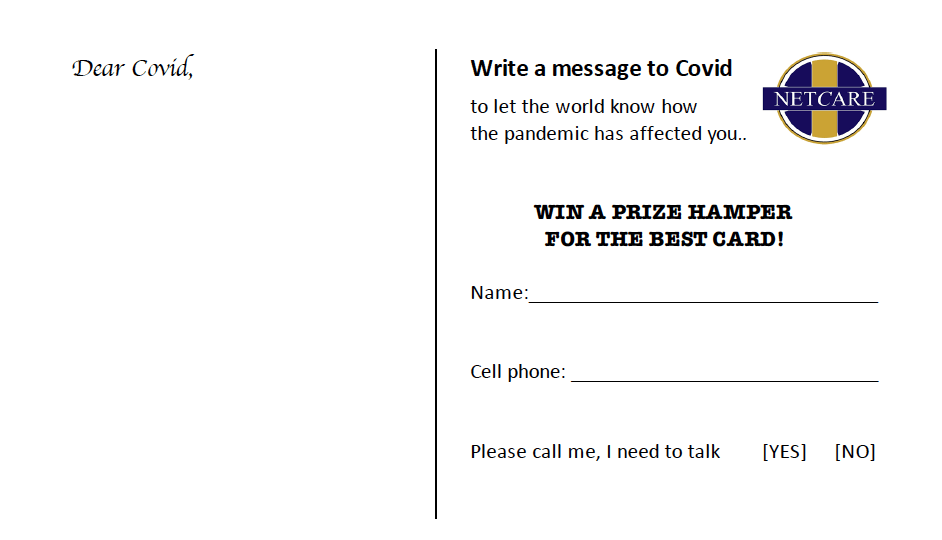A Postcard to Covid
One thing has worried me during Covid and initially no one understood.
To survive and heal after this pandemic we need to remember the story of what happened.
Our modern instant access to newsfeeds and intrusive social media have overloaded us with statistics and disease progression. In a few years’ time if we look back and do an internet search we will have access to all the details of what happened. We will be able to recount the spread and the death rates, the financial fallout and effect of the recession. The debate on wearing a mask will hopefully have been silenced. There will be articles on the development of a vaccine. Science and medicine and economics will dominate the records.
But the story of how we felt, how it affected us, the way our minds took a beating, all those will be lost in the millions of pages of data.
That is unless you send a postcard to Covid and let the virus know how it has affected you and how you feel. At least you don’t have to say ” I survived 2020 and Covid and all I got was this lousy postcard…
I am sure that writing a postcard uses another part of your brain. It forces you to find a spot to place the card on a table and pick up a pen. You may not put the tip of the pen in your mouth for inspiration because you are wearing a mask, but the ideas will come. There are different pathways in the brain that engage more cells than when you pick up your mobile phone to send a message. Trust me, picking up a pen in itself can be healing.
Yes our stories during the pandemic have the power to help us heal.
We have all been traumatized. If I look at our little hospital that was closed by the Department of Heath early on in the pandemic because we had an outbreak, I knew already then that there would be suffering. I do not want to minimize the suffering that anyone has gone through, but our nurses are the ones who put their lives on the line. They are the ones who held the hands as patient after patient died from lack of oxygen on their watch. They are the ones who stood in for the family who could not visit. They are the ones who escorted the dying to the other side. They have a sad story to tell.
The idea of a postcard came to me in the last few weeks while I was studying a course hosted by the University of Cape Town on Medicine and the Humanities by Associate Professor Susan Levine and Professor Steve Reid. I have also been attending a course hosted by Laurel Braitman of the Department of Narrative Medicine at Stanford University. It is Laurel’s inspiration ( and very likely one of her prompts) that made me realise that we had to find a way to tell our stories through this pandemic.
So pick up a postcard and tell us what Covid has made you feel. If you need to talk about it tick the box and we will get back to you.
I know the strength of the human spirit that prevails and look forward to sharing your inspirational stories.

Thank you Basil, this is such a great idea, I think i will give it a try. Best regards Katerina
LikeLike
Super…thank you and stay safe
LikeLike
Dearest Basil
It was heart-warming to read your most recent blog and I commend you for taking the initiative of inviting ordinary people to share their personal experience of the COVID pandemic. It is insightful of you to mention the enormous amount of data that floods our electronic screens daily: big data on statistics, clinical outcomes and the tantalizing prospect of an imminent vaccine. Much of this data only serves to amplify our fears and guilt; somehow hope is crushed under this avalanche of doom and gloom. As healthcare workers, we have carried the burden of fear of contagion; guilt of infecting vulnerable loved ones and have had to endure loss in all its forms. It is now time to start the healing process. For too long we have been living in crisis mode, focusing only on staying safe, one day at a time. We have lost ourselves in this process, forfeiting our comforting social interactions and personal growth to conform with safety regulations. As clinicians it feels we have lost touch with a part of our professional identity. Perhaps the first step in order to emerge from this dystopian time is to articulate how we feel. What better way than to put pen to paper and engage in dialogue directly with our foe. I am certain this project will be at once cathartic and yield a wealth of wisdom. Well done!
LikeLike
Thank you for your kind and eloquent words Ines. We can only hope for relief and healing with words.
LikeLike
I salute each and every frontline hero for continuing to serve their patients in extenuating circumstances. Every interaction must feel like one is dodging a bullet. Sadly, I expect this may not be the last pandemic we see, and I hope we take the learnings forward into the “new normal”. Another insightful and sensitive blog and an excellent idea.
LikeLike
Thank you Andrea
LikeLike